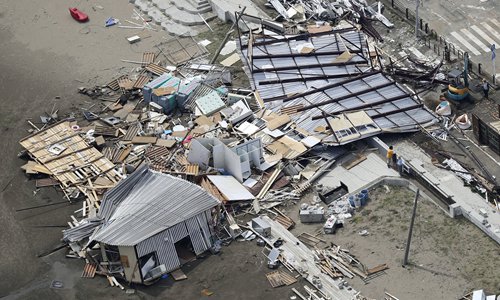HOME >> WORLD
Typhoon Faxai slashing Japan
Source:AFP Published: 2019/9/9 19:23:40
Tokyo battered as transport thrown into chaos

Photo taken from a helicopter shows a destroyed seaside cottage in Miura, Kanagawa Prefecture, eastern Japan, on Monday, after Typhoon Faxai landed near Tokyo. Photo: VCG
A powerful typhoon that battered Tokyo overnight with ferocious winds killed one person, police said Monday, as halted trains caused commuter chaos and more than 100 flights were cancelled.Typhoon Faxai, packing record winds of up to 207 kilometers per hour, made landfall in Chiba just east of the capital before dawn, after barreling through Tokyo Bay.
The transport disruptions unleashed by the storm came less than two weeks before the start of the Rugby World Cup, and delayed the arrival of the Australian team - a reminder that Japan's typhoon season could present challenges for organizers.
Police confirmed one person was killed in the storm, a woman in her fifties who was found dead in Tokyo. Security camera footage showed she was pushed across a street and into a wall by high winds, a police spokesman said.
More than 30 people were injured in the storm, the Kyodo news agency said, including a woman who sustained serious injuries after pillars at a golf range were toppled by high winds and hit a house.
Non-mandatory evacuation orders were still in place at 8:00 am for nearly 340,000 people, and authorities said more than 2,000 people had taken refuge in shelters.
The strong winds downed trees and power lines, which left 910,000 people without electricity in the Tokyo area Monday morning, NHK said.
And at least 10 homes were damaged in Shizuoka, with windows shattered and cars flipped on their sides, local media reported.
Elsewhere, scaffolding was ripped from buildings and protective sheeting hung to keep construction debris off the streets was crumpled and torn by the storm.
While the damage was relatively light given the wind speeds, it was enough to cause chaos in the capital's notoriously busy morning commute.
The overland East Japan Railway train system was largely halted in the early hours of operation while tracks were checked for fallen trees and other debris from the storm.
The storm also caused delays and stoppages on subway lines, leading to massive crowds at some stations in the busy metropolitan area that is home to 36 million people.
Bullet train services that were suspended during the storm had largely resumed, though some were operating on a reduced schedule. Some roads were blocked by downed trees.
And trains running to and from Narita International Airport were halted, with buses and taxis the only options left to those arriving or hoping to fly out.
And at least 138 domestic flights were cancelled, with the weather even delaying the arrival of the Australian rugby team due in Tokyo on Monday ahead of the World Cup that kicks off on September 20.
The weather agency warned that landslides were still possible in Chiba as well as the northern Fukushima region as the storm headed away from land.
Japan is used to severe tropical storms and typhoons during late summer and autumn.
Strong typhoon Krosa lashed western Japan in mid-August, bringing strong winds and torrential rain that claimed one life.
And in late August, heavy rains left three people dead when massive floods also hit western Japan.
Posted in: ASIA-PACIFIC